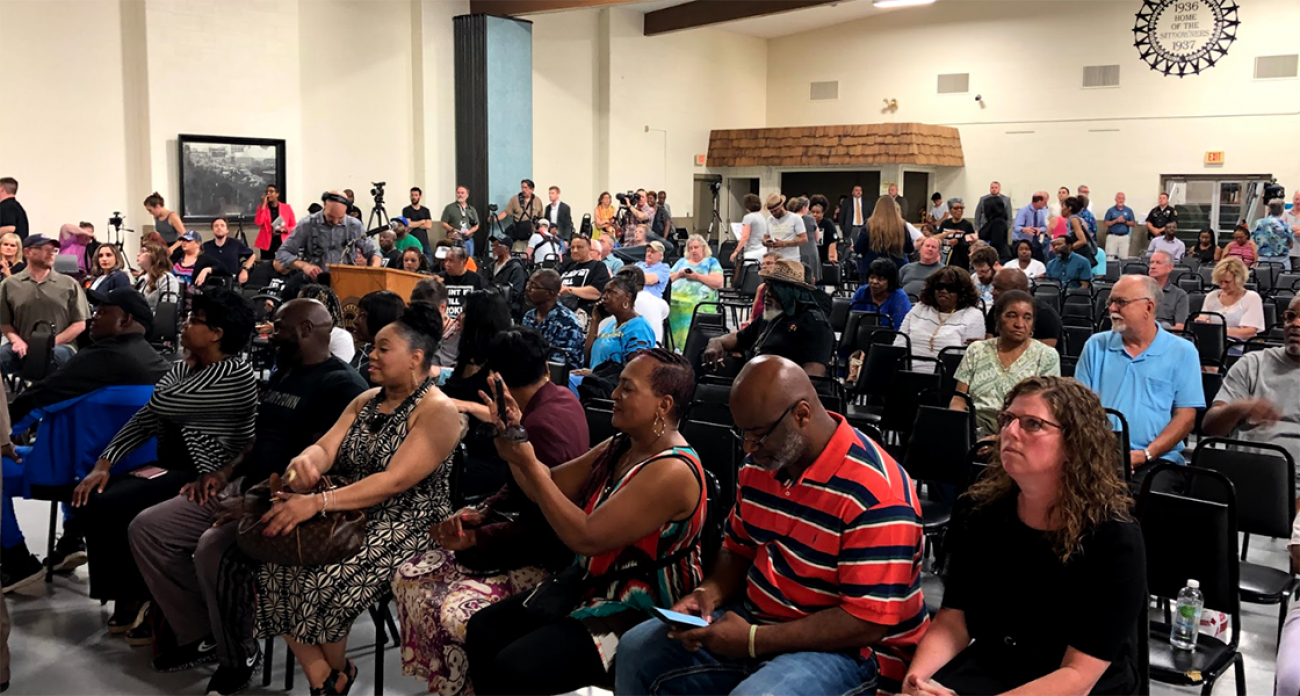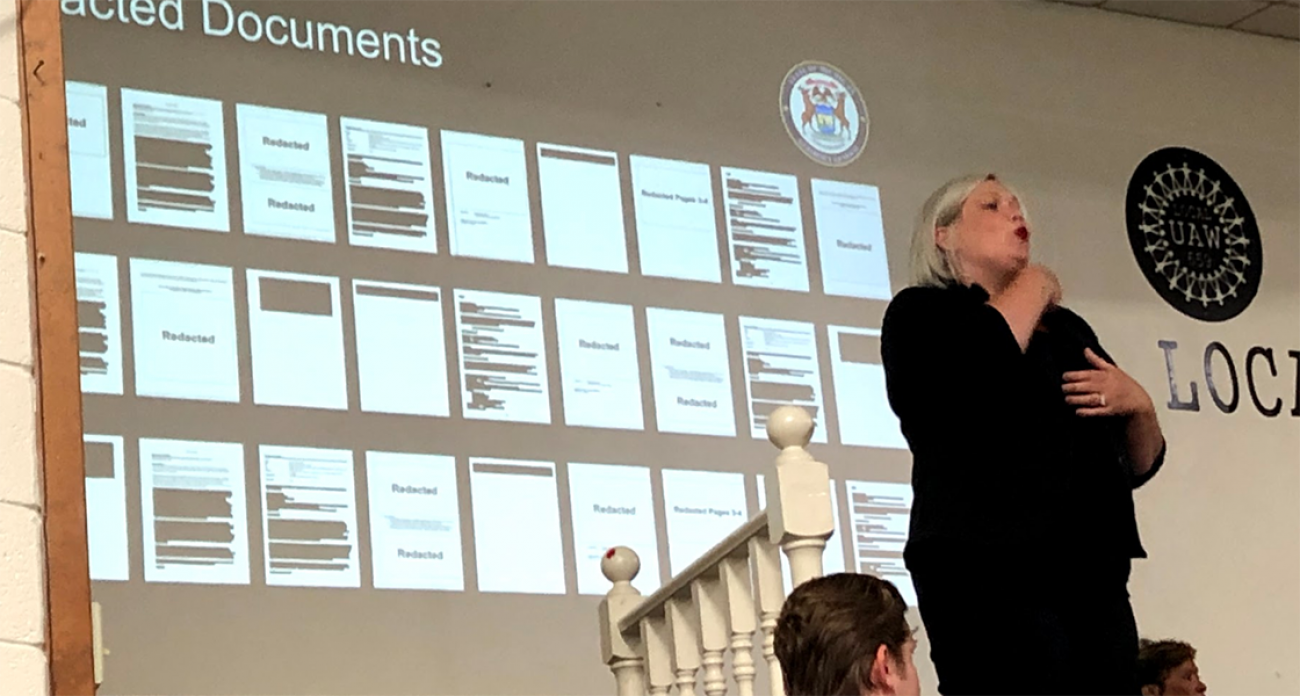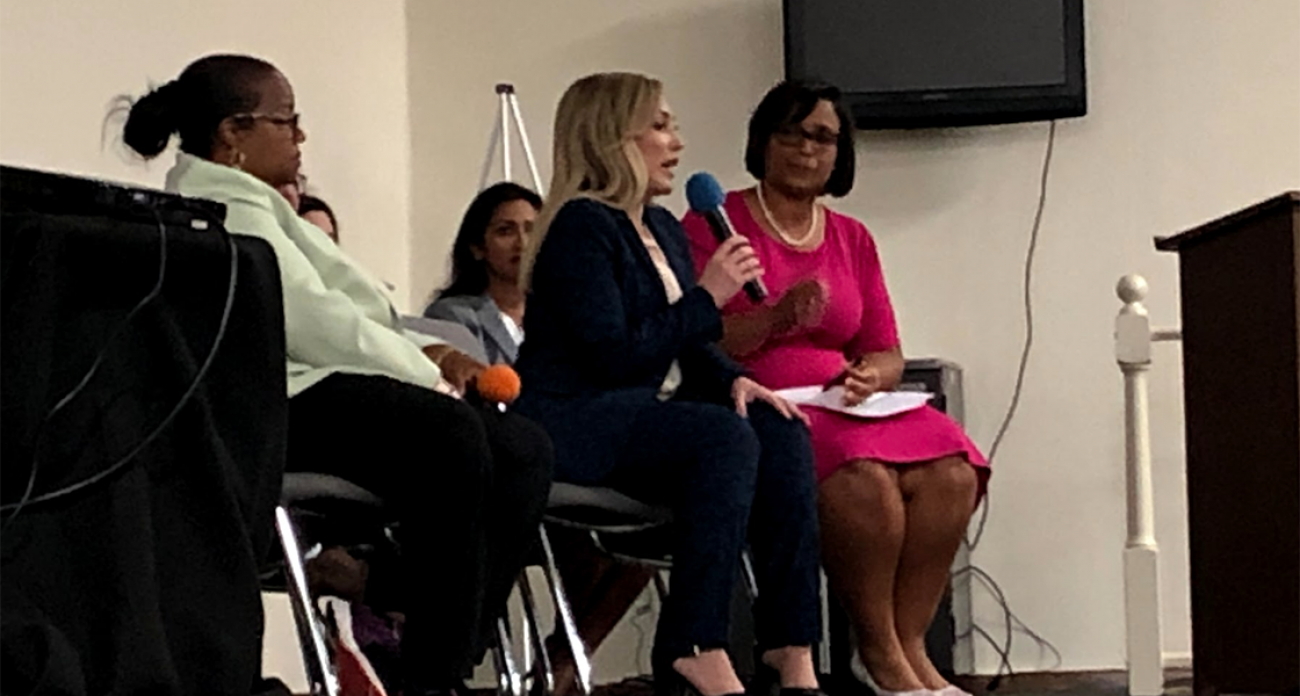New Flint water prosecutors face a skeptical hometown crowd

FLINT—Redacted evidence. Millions of documents ignored. Statutes of limitations bearing down on them.
At an emotional community gathering Friday evening, Flint water prosecutors Fadwa Hammoud and Kym Worthy described finding high-profile criminal cases in shambles following their appointment this year to take over the prosecutions.
“I had never seen anything like it.” Worthy told the gathering. She said she told the prosecution team: “We’re going to have to start from the beginning.”
Which is how the veteran prosecutors, appointed by new Attorney General Dana Nessel, found themselves in a packed union hall Friday explaining to an exasperated crowd of Flint residents why they recently dropped criminal charges against eight remaining city and state officials charged in a crisis that resulted in high levels of lead entering the city’s drinking water.
Related: Dana Nessel's office drops charges in Flint water contamination case
Related: Flint mayor satisfied, but others outraged after water charges dropped

They assured the crowd they would now aggressively follow evidence where it led, and would charge ‒ or recharge, as necessary ‒ any officials found criminally responsible for the water crisis.
But their assurances did little to convince many of the residents the state was capable of delivering long promised justice to the city.
Angry shouts and cries repeatedly filled the auditorium at United Auto Workers Local 659 as the prosecution contended that the case was mishandled by the previous investigation team under then-Attorney General Bill Schuette.
When the prosecutors said there may only be only nine months to file new charges before state statutes of limitations would make criminal charges out of reach, angry cries rang out.
“I have a heavy heart right now. Heavy. It hurts.” Marjioyce Campbell, another Flint resident, said at the microphone, voice cracking. “After I heard what you all have said to us, I cannot believe something like this could happen. You can’t even believe it. But it did.”
Not present Friday, and thus unable to defend their work to the crowd, were Schuette and former Special Counsel Todd Flood. Both previously denied mishandling the investigation, in which 15 people were charged and seven had accepted plea deals to misdemeanors. Schuette told MLive-The Flint Journal Friday his team had built “very solid” cases they were prepared to take to trial on the eight defendants who had their cases dismissed. That trial preparation ended when Schuette left office at the end of 2018 and Nessel arrived, with a new prosecution team.

“We only filed charges where the evidence" showed a crime, Schuette told the paper.
But inside the union hall, Worthy wrote off such defenses as “propaganda” which, “in a case like this, is a form of injustice.”
By dropping the charges, and plowing through millions of pages of previously ignored evidence, the new prosecutors said, they were now able to fully investigate the water crisis and who was to be held responsible. (The charges were dropped “without prejudice,” which means they can be reinstated if prosecutors decide to pursue them.)
Before Hammoud and Worthy took control, they said previous prosecutors had collected 5 phones and 1.5 million pages of evidence. Many of those pages were redacted so the prosecutors couldn’t read the evidence in front of them. They said they soon discovered nearly two dozen boxes of documents and hard drives labelled “Flint” in the basement of a state-owned office building.
“There were some phone dumps we never had. And the first thing we said, ‘If we don’t have this, what else don’t we have?’” Hammoud said she asked.
Now, five months into their work, they said the evidence seized by their team has grown from 5 to over 600 phones and from 1.5 million pages of evidence 20.5 million documents.
The team decided it was better to dismiss charges, which they did June 13, to give themselves more time to sort though the new evidence than to proceed with what they said were only partially-formed cases.
“Please tell me heads are going to roll,” Campbell pleaded of Hammoud and Worthy at the microphone.
Worthy said they would follow the evidence and if they found people criminally culpable, “No matter where they are on this earth, we will charge them.”
Several residents asked if former Governor Rick Snyder, Schuette or Flood would face charges for any role in the crisis or the alleged mishandling of the investigation.
“Nobody is off limits” the Worthy vowed. Even so, the team declined to name any particular charges or defendants they have in mind.
“We have to let the facts and evidence be our guide,” Worthy told reporters after the meeting. “We have to be able to take these cases and go to court and win them.”
The state of the case, coupled with pending statutes of limitations, left many residents worried time is running out to secure even a semblance of justice five years after a state-appointed emergency manager ordered that Flint switch its source of drinking water to the Flint River in a bid to save money for the cash-strapped city, with disastrous results.
“I’m really afraid of us to fall on our face… and all of this will be for nothing,” Joelena Freeman, Flint resident and member of the Democracy Defense League said with quivering lips and watering eyes after the meeting.
Prosecutors repeatedly assured residents the statutes of limitations would not get in the way of justice, pointing out for instance that more serious charges, including manslaughter, have a longer statute of limitations period in Michigan than official misconduct.
“But the misconduct caused the manslaughter,” Worthy acknowledged, “and that’s why it’s important” that they work toward the shorter timeline.
“Do they know what they’d say to us if the statute of limitations runs out?” Freeman asked. “We’re just terrified…This is a real cliffhanger.”
See what new members are saying about why they donated to Bridge Michigan:
- “In order for this information to be accurate and unbiased it must be underwritten by its readers, not by special interests.” - Larry S.
- “Not many other media sources report on the topics Bridge does.” - Susan B.
- “Your journalism is outstanding and rare these days.” - Mark S.
If you want to ensure the future of nonpartisan, nonprofit Michigan journalism, please become a member today. You, too, will be asked why you donated and maybe we'll feature your quote next time!




